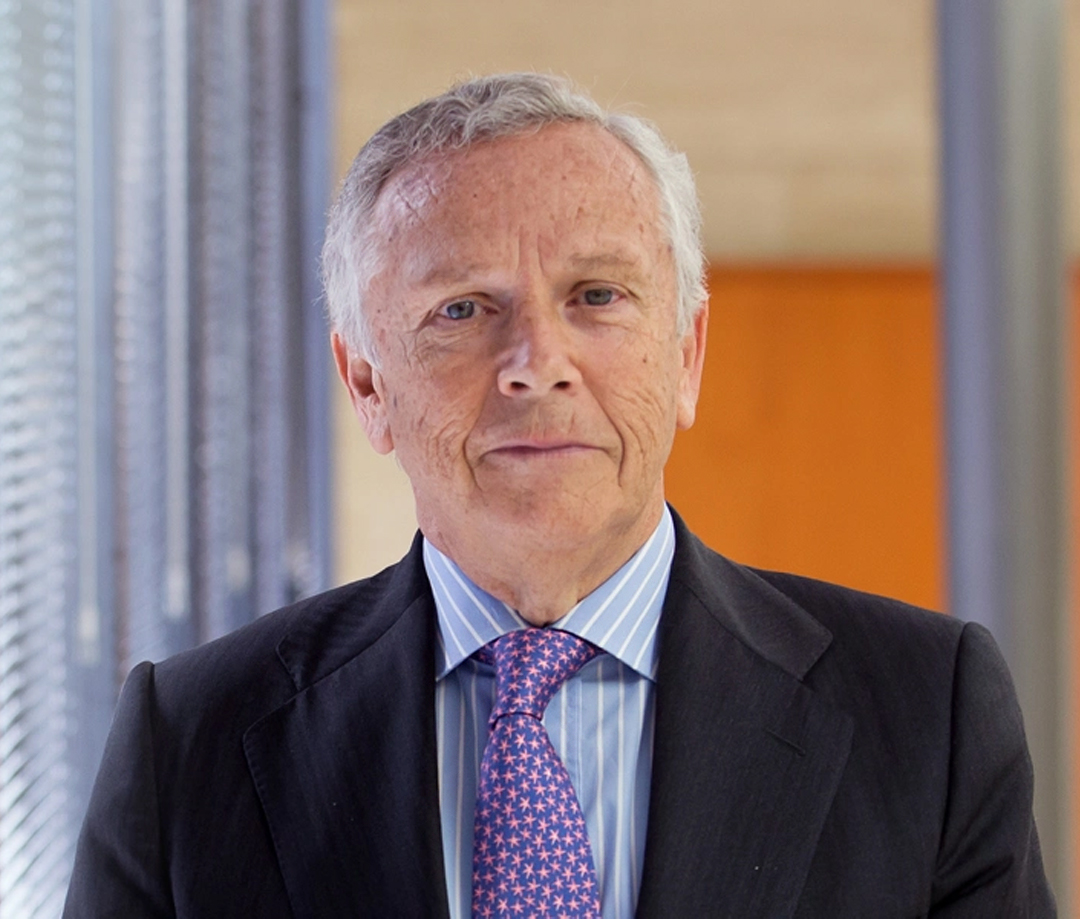Letters
“We closed the 2022 financial year with a positive assessment, both in terms of solvency ratios and management indicators”
Jaime
Aguirre de Cárcer y Moreno
PRESIDENT

Letters
“We closed the 2022 financial year with a positive assessment, both in terms of solvency ratios and management indicators”
Jaime
Aguirre de Cárcer y Moreno
PRESIDENT
I would like to begin this letter with a few words of sincere and deep gratitude to my predecessor, Mr. Juan Echevarría Puig, president of Mutua Universal from 2004 until 2022. The past year of his presidency is embodied in this Management Report and Sustainability Report 2022, which undoubtedly belongs to his mandate. An honest person and tireless worker, he is endowed with great sensitivity to human concerns and always open to conversation; those of us who have had the opportunity to share time with him have been able to enjoy a source of extraordinary wisdom.
During his 18 years as president of Mutua Universal, Juan Echevarría has given his all, personally and professionally, to the entity, placing all his important personal and professional background at the service of the mutual in the most brilliant way. Much of the progress and achievements that have made Mutua Universal what it is today have been thanks to his effort, dedication and perseverance. Similarly, his strong and rigorous leadership skills have allowed the entity to reach its current levels of governance.
Taking the opportunity that this letter gives me, I want to express my recognition and admiration for all of it.
Secondly, I would like to thank the Mutua Universal Board of Directors for having kindly placed their trust in me to continue with the work of presiding over the entity, to whose Board I have belonged since 2011. I have had more than 12 years to be able to monitor the evolution, good work and responsibility of the organisation.
I take on the commitment with enthusiasm, a vision of the future and responsibility. I am proud to represent Mutua Universal in whatever area is required.
My efforts will always centre on preserving what has been built during the presidency of Juan Echevarría. It is a legacy that encourages and challenges me. It compels me to look to the future – as he has always done – with enthusiasm and exigence. Guaranteeing the continuous improvement of our work and a firm control through the promotion of actions and projects aimed at ethical and responsible conduct and good corporate governance, for the sake of maximum transparency in management.
Summarising 2022 in just a few lines is extremely difficult. The year has passed between optimism about overcoming the worst of a global pandemic, with the subsequent expectation of an economic recovery; and the geopolitical uncertainty caused by the start of the war in Ukraine and its devastating human and economic consequences, which apply to the entire world. It has been the year of the European energy crisis, the most serious crisis since the 1970s, according to the Organization for Economic Cooperation and Development (OECD). There have been bottlenecks in the supply chain and a persistent upward growth in consumer prices, leading to a tightening of monetary policies on an international scale and levels of inflation that hamper the growth of countries and increase the production costs of companies.
The Spanish economy, like most other European countries, responded to this turbulent global panorama with slow growth during the first and second quarters of the year, driven by the end of restrictions and the return of tourism after the pandemic, and with a sharp slowdown from the second half of the year due to the impact of price increases and inflation. Using GDP as an example, it went from growing 2.2% between April and June to 0.2% between July and September. The unemployment rate is also illustrative, which continues to be close to 13%, one of the highest in the euro area, despite the fact that employment at the end of 2022 rose to levels before the real estate bubble burst in 2008.
CURRENT SCENARIO
In spite of everything, according to data from the National Institute of Statistics (INE), the country’s economy grew by 5.5% in 2022, supported by consumption and the foreign sector, although without recovering the volume of before the shock of the epidemic. Spain was also the country in the euro area that experienced the greatest drop in inflation at the end of the year, despite the fact that core inflation, which excludes energy and food, rose two tenths to a record of 5.2%. Be that as it may, it is a slightly better situation than could be expected, given how the year has evolved.
In the midst of all this uncertainty, with a clear slowdown but some hopeful signs, Social Security – an entity with which we collaborate and on which we depend – has been suffering, for many months now, from a debt that has skyrocketed to over 100,000 million euros. With pension savings trembling with fear as we wait to see the consequences of the contribution provided by the increase in social contributions of the new Intergenerational Equity Mechanism approved just before the end of the year. It is a measure that directly affects wages and the cost faced by companies for their workers.
We have, on the horizon, the upcoming general elections on July 23, which were called one day after the 28-M elections, in which the Socialists suffered a heavy defeat at the polls by losing the municipal votes against the PP, subsequently losing a good part of the autonomous communities in which it governed. The call for these elections has stopped more than 60 laws in Parliament, among which were the modification of the National Security Law, the last pension reform package, another one for improvements to household employees, that of the contributions of self-employed people, one that proposed the creation, post-Covid, of a State Public Health Agency, and another that wanted to expand maternity and paternity leave, among others.
This represents the mutuals which collaborate with Social Security, which are responsible for protecting the labour contingencies of more than 1.4 million companies, and which represent a market share of 98.7% with respect to the total system; of more than 18 million people working for others, 97.2% of the total system; and more than 3.2 million self-employed workers affiliated. It is a sector closely linked to legislative changes and the ups and downs of the economy, which began the year with the merger of two entities, and which ends with a positive result thanks to additional financing. It has been weighed down for too long by the extremely high rate of work absenteeism derived from temporary disability due to common contingencies. It is a contingency which is still underestimated by the Government, with coefficients relative to the fraction of quota that the mutuals receive to deal with the payment of the consequent economic benefit which is still insufficient in view of the volume of absenteeism. It continues to put the sector in a borderline situation, with no room for manoeuvre, despite the offers of help from the mutuals to help expedite the recovery of workers in this area, a coverage that is already given during medical leave due to work accidents.
Today work absenteeism is a global problem in Spain that directly affects people’s health, the productivity and competitiveness of companies and the sustainability of the Social Security system and the welfare state. It is a conundrum that can only be dealt with via the reformulation of the effective public-private collaboration that the mutual collaborators and the Social Security uphold.
With regard to Mutua Universal, the area of our activity, we closed the 2022 financial year with a positive assessment, both in terms of solvency ratios and management indicators. A positive result is to be distributed, of 56.75 million euros and a Stabilization Reserve of Professional Contingencies endowed to the maximum, it demonstrates our good work and perseverance.
We have had an increase in associated companies, which at the end of the year were 157,985, and in protected and affiliated workers (1,638,363), as well as in the collection of social security contributions.
This performance, governed by the unity of purpose, is guided by the social interest, understood as the achievement of a sustainable activity in the long term, with respect to the laws and regulations, and a conduct based on good faith, ethics and the respect for uses and good practices. Reconciling the social interest with the legitimate interests of our interest groups and with the due positive impact of our activities on society and the environment.
AGILE AND MODERN ORGANISATION
We are therefore facing the future with the confidence that economic viability gives us and the conviction of a solvent entity capable of effectively and efficiently managing the services that we have legally attributed – and that increase over time – as essential collaborator in the sustainability of the system. We contribute to this via the protection of the health of workers, the promotion of a culture of prevention, socio-labour support and the payment of benefits.
At this point I would like to thank all the associated companies, protected and affiliated workers and collaborating consultancies that have trusted our work.
I would also like to thank the entire staff of Mutua Universal, the true engine of the entity. Your effort and professionalism make this an agile and modern organisation which is capable of adapting and anticipating the needs of our different interest groups, a challenge that you face with the support of an adequate organisational structure and clear strategic lines with a long-term vision. Only in this way can the challenges that the future presents be faced.
I am also grateful to the managing director, Juan Güell, a reference in the sector, for the drive and vision for the future that he always shows. To the Board of Directors, which dedicates the maximum attention and resources to the proper governance of the entity. To the Control and Monitoring Committee, the Special Benefits Committee and the Audit and Compliance Committee for their essential work. To the president and managing director of AMAT. And of course, to the Public Administration with which we collaborate so closely.
Thank you very much.
